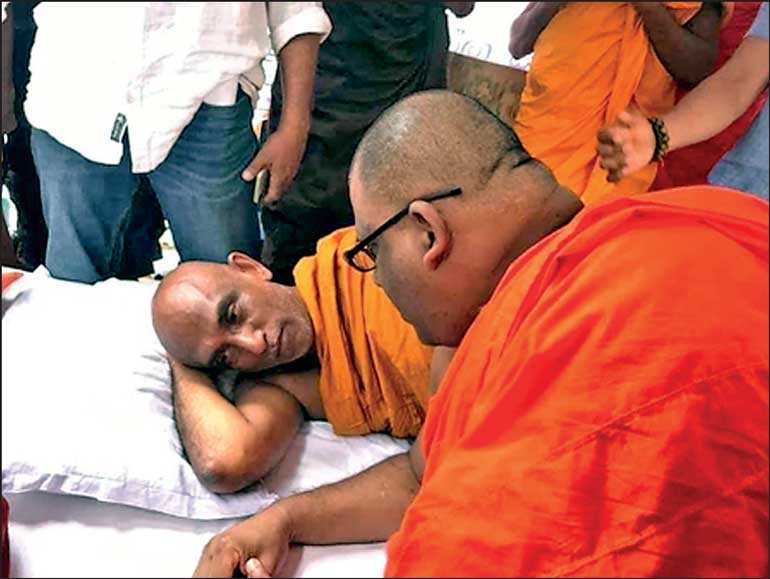Monday Feb 23, 2026
Monday Feb 23, 2026
Wednesday, 12 June 2019 00:00 - - {{hitsCtrl.values.hits}}

All Muslim ministers resigned in protest of the anti- Muslim campaign of Buddhist Bhikkhus Athuraliye Rathana, a politician, and Galagoda Aththe Gnanasara, a political activist. Prior to that, Governors Azath Salley and M.L.A.M. Hizbullah had resigned.
First of all, it should be stated that these Bhikkhus acted against the basic principles of Buddhism. Promoting racism, and thereby spreading hate among the masses, is an attack against the foundation of Buddhism, which has never justified killing or harming anyone under any circumstances.
All who had common sense expected that there would be a communal backlash as a result of the Easter Sunday attacks. At the initial stage, the situation was under control, due to the intervention of the Cardinal. However, the situation went out of control later. There were allegations that there was political influence as well. The intervention of the Cardinal at the initial stage was in a national perspective, but later it was evident that there was a political perspective as well.
The tug of war of the two main partners of the ruling coalition has come to a zenith, through the effort of convincing the people of who was responsible for the failure to avoid the Easter Sunday attack. All of them, including the Opposition, lacked empathy in this situation. On one hand, there is a Select Committee of the Parliament to which the President has objected, and on the other hand Rathana Himi started his hunger campaign. Both these acts were democratic, but the latter ignited the communal unrest which was cooling down. If both Bhikkhus, Rathana and Gnanasara, while calling for the resignations of the persons concerned in order to facilitate the inquiries of the allegations against them, requested the masses not to intimidate ordinary Muslims who were innocent, and stated the problem cannot be solved by actions such as boycotting Muslim shops, then their protest would not have taken on a racist outlook. Their action received mass support throughout the island since there was racism within. People can be provoked very easily in this way.
However, Gnanasara Himi later said that due to the act of Rathana Himi, ordinary Muslims were forced towards extremism, and it was the moderate Muslims who revealed the actions of the Muslim extremists at the initial stage. We do not know whether the stances of these Bhikkhus were changed from time to time, or the merchants who sell news for their livelihood based on ratings had illustrated what they wanted out of the messages of these Bhikkhus.
However, Muslim Ministers have given an excellent democratic answer to this demand. The crux of it was that when there was a tug of war between two parties, one party let the rope go. Buddhists and Buddhist Bhikkhus who are engaged in racist activities should realise that the answer of Buddha to the dilemma of life was also the same. The action taken by the Muslim ministers was in line with the recommendation of the Buddha, who was not a racist, caste-minded person, Buddhist or magician, and who was only a supreme human being. As a result, the posteriors of Rathana Himi, the political henchmen standing behind him, and the people who were provoked in the line of racism, were hit by the ground. Gnanasara Himi was able to reduce the impact since he has changed his stance subsequently.
Gnanasara Himi publicly said that there could be chaos (senakeli) throughout the island if the persons concerned did not resign within a day. It is commendable that he changed his stance later. However, it was a provocative statement. Muslim MPs have one more thing to do. They can demand that the investigations against the relevant Muslim leaders should be conducted and finished within a reasonable period, and if not, they also can tender their resignations from the Parliament. The majority Sinhalese, who were not convinced by any religious or political leader about the danger of racism to the general public, to the country at large, and to the national security of the country in the light of rival foreign influences, may realise the gravity of it by actions like this.
Also, the answer to the fact that the deviation from the general culture of the country by the Muslim community is to negotiate with them, and not to attack them and push them to extremism. A manager who controlled a factory during a condition of a strike would understand this. Sinhala leaders also contributed to this deviation in exchange of votes.